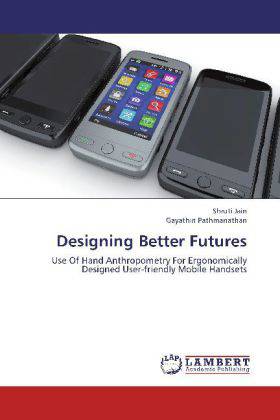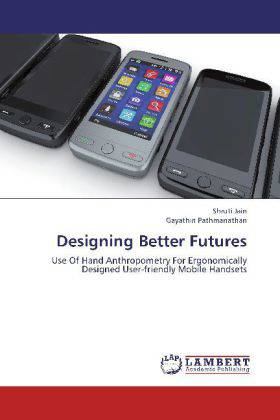
Je cadeautjes zeker op tijd in huis hebben voor de feestdagen? Kom langs in onze winkels en vind het perfecte geschenk!
- Afhalen na 1 uur in een winkel met voorraad
- Gratis thuislevering in België vanaf € 30
- Ruim aanbod met 7 miljoen producten
Je cadeautjes zeker op tijd in huis hebben voor de feestdagen? Kom langs in onze winkels en vind het perfecte geschenk!
- Afhalen na 1 uur in een winkel met voorraad
- Gratis thuislevering in België vanaf € 30
- Ruim aanbod met 7 miljoen producten
Zoeken
Designing Better Futures
Use Of Hand Anthropometry For Ergonomically Designed User-friendly Mobile Handsets
Shruti Jain, Gayathiri Pathmanathan
Paperback | Engels
€ 48,45
+ 96 punten
Omschrijving
Though technologies may improve how much content a device can provide, the way people use them ultimately determines the impact of the user experience. The phone that opens the world to new ways of connecting must not be conceived as a mobile computer but as a unique space with its own implications and transformations. Young people, in their insatiable quest to embrace the new, have quickly adopted these devices into their lives in ways that emphasize the unique experience of the phone. Their uses and experiences are the key to understanding the changed world of mobile connectedness. This has many implications for society at large but in particular for the ways we think about education. Educators must embrace this drastic change and explore new ways to engage young people s new found relationship with their world, or continue missing the opportunity before us.
Specificaties
Betrokkenen
- Auteur(s):
- Uitgeverij:
Inhoud
- Aantal bladzijden:
- 64
- Taal:
- Engels
Eigenschappen
- Productcode (EAN):
- 9783659269448
- Uitvoering:
- Paperback
- Afmetingen:
- 150 mm x 220 mm

Alleen bij Standaard Boekhandel
+ 96 punten op je klantenkaart van Standaard Boekhandel
Beoordelingen
We publiceren alleen reviews die voldoen aan de voorwaarden voor reviews. Bekijk onze voorwaarden voor reviews.









